Question And Answer
Publications
Articles, publications, books, tools and multimedia features from the U.S. Institute of Peace provide the latest news, analysis, research findings, practitioner guides and reports, all related to the conflict zones and issues that are at the center of the Institute’s work to prevent and reduce violent conflict.
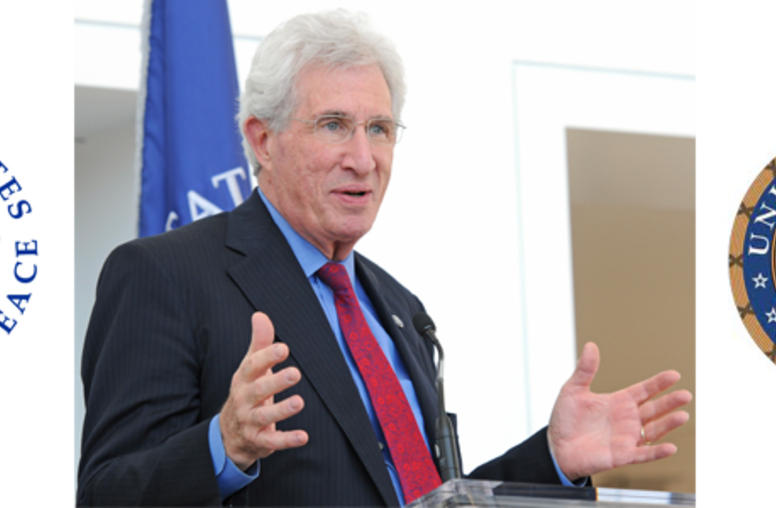
USIP President Testifies Before Congress
Dr. Richard H. Solomon, president of the U.S. Institute of Peace, testified on the important role of USIP in national security affairs.
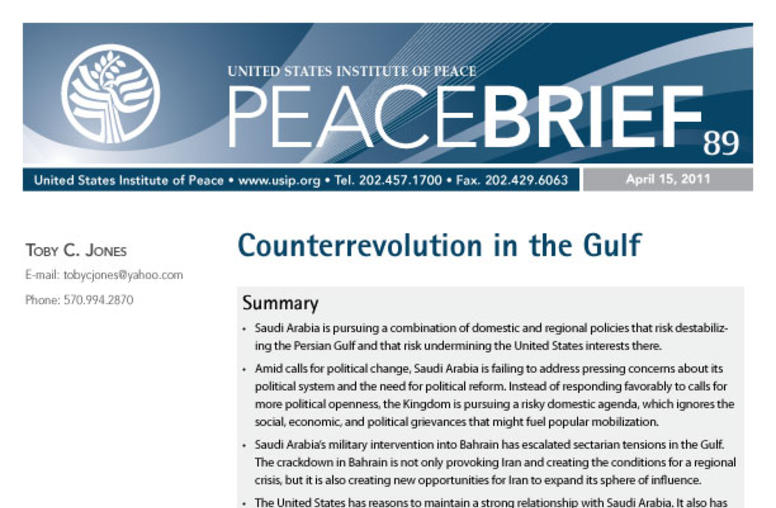
Counterrevolution in the Gulf
Toby C. Jones has lived and worked in Saudi Arabia and Bahrain. Formerly the Gulf Analyst with the International Crisis Group, he is assistant professor of Middle East history at Rutgers University. He is the author of “Desert Kingdom: How Oil and Water Forged Modern Saudi Arabia” (Harvard University Press, 2010).
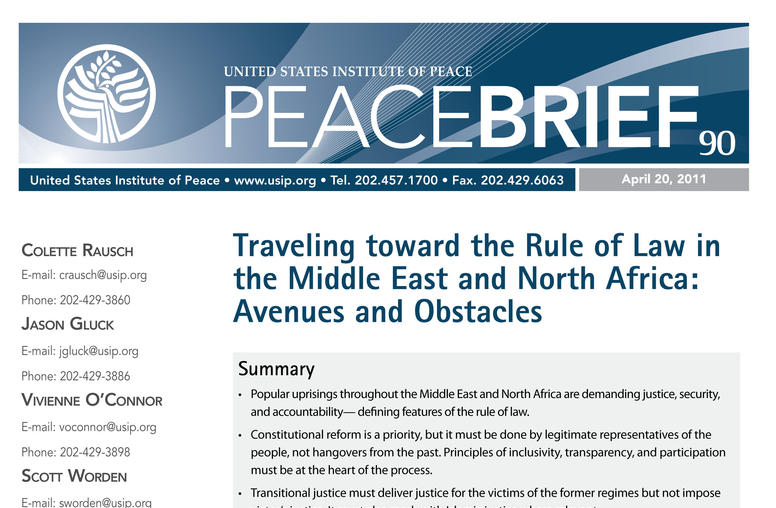
Traveling toward the Rule of Law in the Middle East and North Africa: Avenues and Obstacles
This brief was written by the director of USIP’s Rule of Law Center of Innovation and three of the center’s senior advisers: Colette Rausch, Jason Gluck, Vivienne O’Connor and Scott Worden. The authors’ analysis is informed by their knowledge of the Middle East and North Africa and their firsthand experiences in promoting the rule of law in transitional states such as Afghanistan, Cambodia, Haiti, Iraq, Kosovo and Nepal.
Yemeni President Agrees to Cede Power
Yemeni President Ali Abdullah Saleh agreed to accept a Gulf Cooperation Council-brokered plan this weekend that allows him to cede power in exchange for immunity, a government official said.
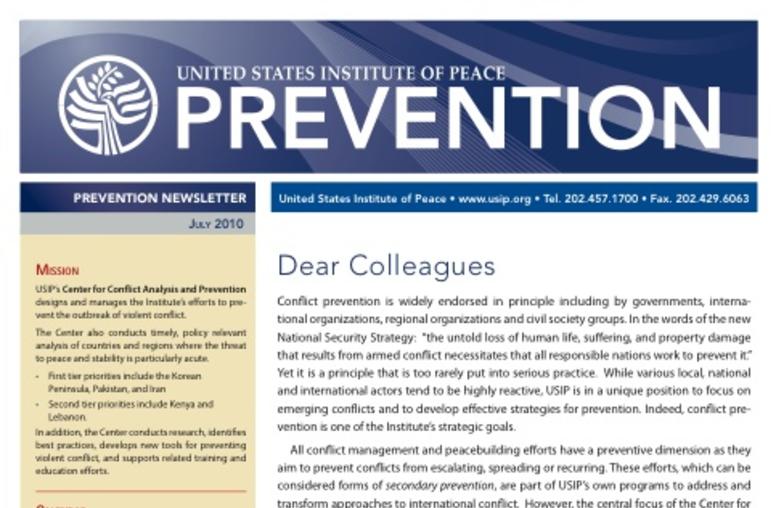
USIP Prevention Newsletter - May 2011
The bimonthly Prevention Newsletter provides highlights of the Institute's conceptual and region specific work aimed at helping to prevent conflicts in Africa, the Middle East, South and Northeast Asia, and the special project on genocide prevention. It also provides Over the Horizon thinking on trends in different regions, as well as information about events, working groups and publications.
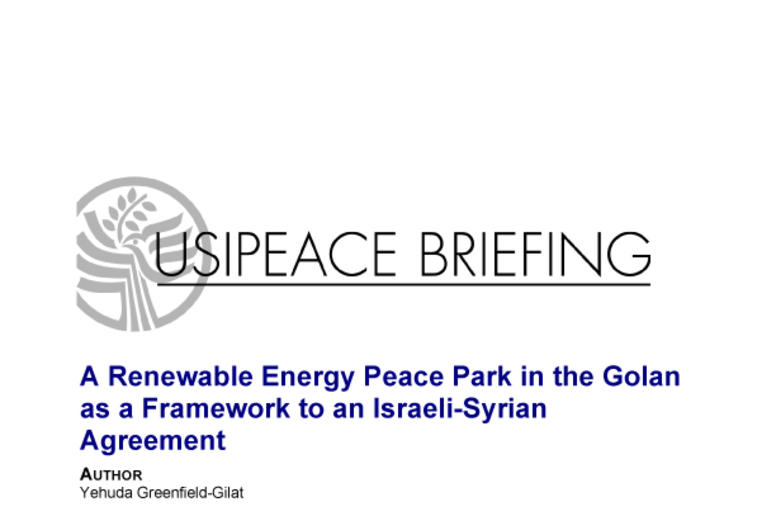
A Renewable Energy Peace Park in the Golan as a Framework to an Israeli-Syrian Agreement
The widely discussed Syrian-Israeli peace park concept is rooted in the assumption that Syrian and Israeli "good will" for cooperation is sufficient to mobilize a long- lasting, firm peace treaty between the two countries. The current discussions on a layout for a peace park provide a description of the mechanisms that will control and maintain the park, but fail to provide the insights for how to keep these mechanisms functioning in one, five or ten years into the future.
Smart Tools for Smart Power: Simulations and Serious Games for Peacebuilding
var s1 = new SWFObject('http://www.usip.org/files/player.swf','player','320','260','9'); s1.addParam('allowfullscreen','true'); s1.addParam('allowscriptaccess','always'); s1.addParam('wmode','opaque'); s1.addParam('flashvars','&type=fcsubscribe&streamer=rtmp://usip.fc.llnwd.net/usip&file=usipsimsvideo&subscribe=true' ); s1.write('preview1'); To view video and discussion simultaneously, we recommend launching the video player into a separate window. Slower Connections: Try the Audio...
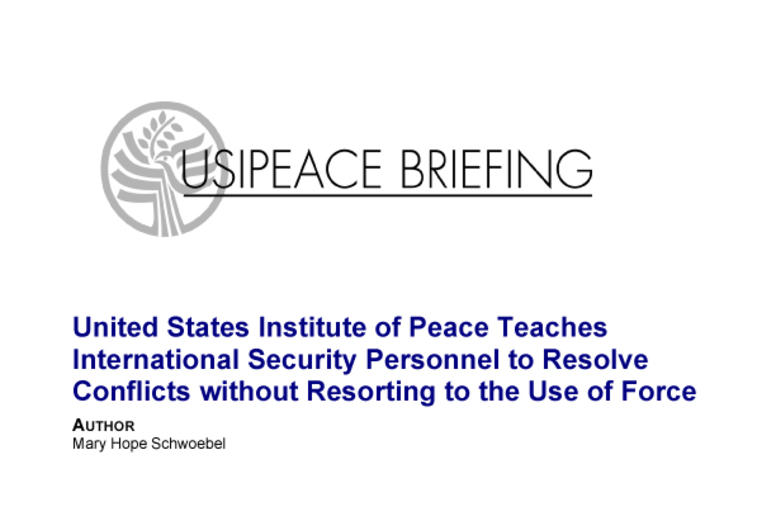
U.S. Institute of Peace Teaches International Security Personnel to Resolve Conflicts without Resorting to the Use of Force
Over the past decade, the United States Institute of Peace (USIP) has trained members of police and military forces around the world to prepare them to participate in international peacekeeping operations or to contribute to post-conflict stabilization and rule of law interventions in their own or in other war-torn countries. Most of the training takes place outside the United States, from remote, rugged bases to centrally located schools and academies, from Senegal to Nepal, from Italy to th...
Hearing on the Afghan Economy
USIP Visiting Research Scholar Jeremiah S. Pam testified on July 14, 2009, before the House Oversight and Government Reform Subcommittee on National Security and Foreign Affairs on efforts by the U.S., the Afghan government and others to spur the Afghan economy in an effort to stabilize the country.
A Conversation with Iraq’s Prime Minister Nuri Al-Maliki
Iraqi Prime Minister Nuri Al-Maliki spoke on July 23, 2009 at an exclusive public engagement at USIP and answered questions from our audience.